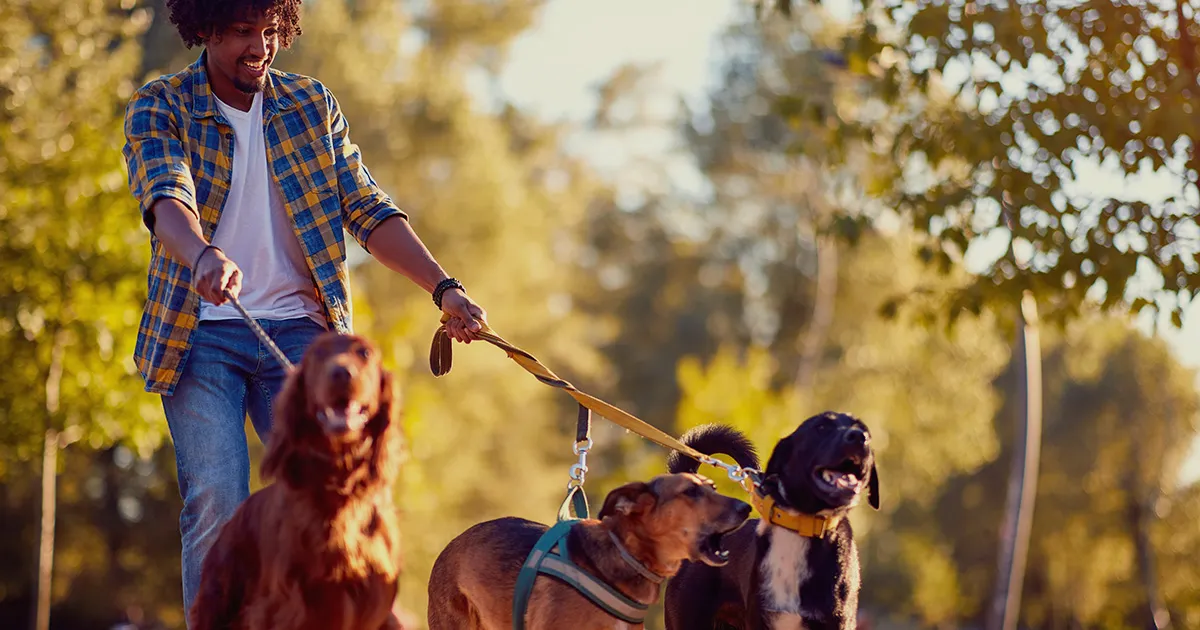Embarking on a journey to establish a dog walking business in the UK is a venture brimming with potential, especially if you possess a deep affection for canines. This sector stands out for its escalating demand, a relatively low barrier to entry, and the promise of profitability. The recent surge in pet ownership across the UK, coupled with many owners returning to their workplaces, has created a robust market for reliable dog walking services. This guide will walk you through every essential step, from understanding market demand to ensuring you have the necessary skills for dog walking and proper insurance, to successfully launch and grow your business in this thriving industry.
Why Consider a Dog Walking Business in the UK?
The pet care industry in the UK has shown remarkable resilience and growth, even through challenging economic times. Recent studies indicate that British households spent over £9 billion on pet-related products and services in 2021, a figure projected to increase further. This trend aligns with the significant rise in pet ownership observed since 2020. Consequently, professional dog walkers are in high demand, particularly as individuals return to office-based work, leaving their beloved pets at home during the day. Furthermore, the summer months bring an additional spike in demand, with many pet owners seeking reliable care for their dogs while they are away on holiday. For those genuinely passionate about dogs, this presents an opportune moment to establish a meaningful and profitable business.
Essential Market Research for UK Dog Walkers
To truly thrive as a dog walker, meticulous market research is indispensable. This involves thoroughly investigating your local area to identify existing competition and pinpoint underserved niches. Utilise online resources to scout competitors and uncover potential gaps in the market that your business could fill.
Key questions to guide your market assessment include:
- Which specific geographical areas are most dog walkers currently covering?
- What are the prevailing hourly rates charged by dog walkers in your target vicinity?
- Is there a demand for group walks, or do clients primarily seek individual attention for their pets?
- What local facilities are available for dog walking, such as public parks, green spaces, and convenient parking options?
One of the most effective strategies for gathering actionable insights is to engage directly with established local dog walkers. Many in the profession are approachable and willing to share their experiences and knowledge, particularly if you are exploring areas they do not intend to cover. Their real-world perspectives can offer invaluable lessons for your nascent business.
Calculating Your Startup Costs
Compared to many other business ventures, starting a dog walking service typically involves some of the lowest initial overheads. The primary expenditures you’ll face include dog walking insurance, obtaining a criminal background check (DBS), and marketing efforts. While marketing can represent a significant portion of your initial outlay, there are numerous cost-effective strategies to attract clients effectively. Understanding these core expenses upfront is crucial for a smooth launch.
Comprehensive Dog Walking Insurance in the UK
Securing the appropriate dog walking insurance is not merely a recommendation but a critical safeguard for your business. As an absolute minimum, your insurance policy should encompass:
- Public Liability Insurance: This protects you in the event your business activities cause injury to a third party or damage their property.
- Animal Accidents and Injury Insurance: This covers medical costs for dogs in your care should they suffer an accident or injury.
- Loss of Animal Cover: This provides financial assistance to cover costs if a dog under your supervision is lost or stolen.
Beyond these fundamental coverages, you might need to consider additional protections based on your operational model, such as loss of client keys or theft of business equipment. If you plan to employ anyone, even volunteers, Employers’ Liability insurance becomes a legal requirement. Annually, expect to allocate approximately £80 to £150 for comprehensive insurance. Should you be uncertain about the specific types of coverage required, consulting with a reputable pet business insurer is highly advisable.
 Lost dog poster offering a reward pinned to a tree trunk
Lost dog poster offering a reward pinned to a tree trunk
Obtaining a DBS Check
While not legally compulsory for dog walkers, undergoing a Disclosure and Barring Service (DBS) check is an essential step if you aim to build trust and expand your clientele. A DBS check, which verifies your criminal record, offers potential clients peace of mind, especially when entrusting their beloved pets and often, access to their homes, to someone they don’t yet know. You can conveniently apply for a standard DBS check online, typically incurring a cost of around £18. This small investment can significantly bolster your credibility and professional image.
Effective Marketing Strategies for Your UK Dog Walking Business
In today’s digital landscape, establishing a robust online presence is paramount for reaching your target audience effectively. This includes developing a professional website that acts as your online storefront, optimising it for search engines to ensure visibility, and potentially running paid advertising campaigns. Regularly updating a blog with valuable content can also attract pet owners seeking advice. Beyond your own platforms, becoming a member of key professional dog walking directories on the internet and actively engaging on popular social media channels like Facebook, Twitter, and Instagram can expand your reach. Local Facebook groups often permit small business advertising, offering a targeted way to connect with dog owners in your area.
For local client acquisition, traditional methods remain highly effective. Distributing well-designed flyers and business cards in community hubs can directly target pet owners. If you own a van, professional vehicle livery displaying your business name and contact details acts as a mobile advertisement. Furthermore, creating profiles on prominent business directories like Yelp allows customers to leave reviews, which are vital for building trust and attracting new clients through positive testimonials.
Essential Equipment for Dog Walkers
While a dog walking business does not demand an extensive list of equipment, certain items are crucial for efficient and professional operation. Reliable transportation is often a necessity, particularly a van or a suitable car capable of safely accommodating multiple dogs. If using your personal vehicle, ensure your insurance policy is updated to cover business use. Investing in software for managing bookings and payments can streamline administrative tasks, and many affordable options are available.
Beyond the vehicle and software, essential personal gear includes durable walking shoes, spare leads and collars, high-quality dog treats, an ample supply of poo bags, and appropriate outdoor wear designed for all weather conditions. Additionally, consider stocking your vehicle with water bowls and fresh water, along with old towels for drying off wet dogs after walks. Investing in personalised, branded dog walking apparel, such as waterproof parkas, embroidered gilets, windbreakers, and hats, can enhance your professional image and increase your visibility within the community. Expect to spend approximately £30 to £35 for good quality, professional gear.
Gaining Skills and Experience
Unlike some professions, becoming a dog walker doesn’t strictly require formal training or specific qualifications. However, possessing hands-on experience in handling various dogs is absolutely vital—not just for your personal safety and peace of mind, but also for the confidence of your potential clients and the well-being of their pets. It’s important to remember that dogs come in all sizes and temperaments, demanding a nuanced understanding of canine behaviour and effective management techniques, especially when supervising multiple dogs simultaneously.
Initially, you might consider offering your services pro bono to gain invaluable practical experience and build a portfolio. Taking specialized courses in canine behaviour and first aid will not only bolster your expertise but also significantly reassure clients that their beloved companions are in highly capable hands. Reputable providers like City & Guilds offer Level 2 and Level 3 dog walking and pet care courses for around £30. Furthermore, the British College of Canine Studies provides a comprehensive Dog Walkers & Sitters Association (DWSA) certificate course for £129, which covers crucial areas such as behaviour training, dog law, and canine first aid. Beyond general handling, deep dives into canine behaviour are crucial. Consider supplementing your practical experience with knowledge from resources such as the best dog training books for puppies, which can provide valuable insights into early behavioural patterns.
 Woman training a dog with a treat in her hand outdoors
Woman training a dog with a treat in her hand outdoors
To further enhance your expertise and client confidence, exploring advanced training techniques detailed in a total recall dog training book can be highly beneficial, ensuring the safety and control of dogs under your care.
Registering Your Dog Walking Business in the UK
When establishing your dog walking business in the UK, you have several options for registration with HMRC, including operating as a sole trader, setting up a limited company, or forming a partnership. Each structure carries distinct implications for liability and financial responsibility. As a sole trader, you are personally accountable for any debts or liabilities incurred by your business. Conversely, a limited company offers the advantage of separating your personal finances from your business finances, thereby shielding you from individual culpability for business debts. If you’re uncertain about the most suitable business structure, it’s highly recommended to consult the official UK government website for detailed information and guidance on formal business registration.
Navigating Rules and Regulations
Adhering to the rules and regulations established by the UK government is absolutely critical for any aspiring dog walking business. Failure to comply can lead to severe consequences, including the revocation of your operating license. An invaluable resource for understanding these guidelines is the National Association of Petsitters and Dog Walkers, commonly known as NarpsUK. This organization provides comprehensive advice on how to start and operate a dog walking business in accordance with governmental mandates.
Key regulations you’ll need to be familiar with as a professional dog walker include:
- Specific protocols for meeting dog owners prior to the initial booking.
- Restrictions on the maximum number of dogs you can walk simultaneously.
- Procedures for meticulously recording all work undertaken.
- Strict adherence to data protection principles for safeguarding customer personal information.
- Ensuring all dogs under your care wear collars displaying the owner’s name and address.
- Responsibility for cleaning up dog waste to avoid substantial fines.
Animal Boarding License and Pet Sitting Services
Should you decide to expand your services to include providing accommodation for clients’ dogs in your own home, acquiring an animal boarding license becomes a legal necessity. Similarly, if you plan to offer pet sitting services where you look after clients’ pets at their premises, obtaining appropriate pet sitting insurance is crucial. The cost for an animal boarding license can vary depending on your location but typically ranges around £300 to cover the entire process. For those looking to significantly scale their in-home dog accommodation services, considering the establishment of a full-fledged dog kennel business could be a natural progression.
 Basenji dog lying on a wicker rug, looking over its shoulder
Basenji dog lying on a wicker rug, looking over its shoulder
Setting Your Pricing Structure
In the UK, the average hourly rate for dog walkers typically falls between £10 and £20. However, your specific pricing structure will depend on several influential factors. These include your geographical location, the number of dogs you can competently walk at one time, the total hours you intend to work, and the rates charged by your local competitors. A thorough understanding of these variables will enable you to set competitive yet profitable prices for your services.
Securing Reliable Transportation
Depending on the geographical area you intend to cover, having reliable transportation to safely move dogs from one location to another may be a requirement. If you plan to use your personal car for business purposes, it is imperative to adjust your insurance coverage accordingly. Furthermore, you’ll need to assess the capacity of your vehicle’s boot or cargo area to ensure it can safely accommodate multiple dogs. As your client base grows and the number of dogs under your care increases, you might find it necessary to rent or even purchase a dedicated van to meet your transport needs efficiently.
Essential Forms and Contracts
Operating a professional dog walking business necessitates having the correct paperwork in place. Well-drafted contracts and various forms are essential tools for preventing potential misunderstandings and stressful scenarios with clients. As a dog walker, you will likely become accustomed to utilizing a range of documents in your daily operations, including detailed booking forms, essential liability release forms, and veterinary release forms. Having a solid understanding of canine behaviour, perhaps by referencing dog psychology books for trainers, can also help in anticipating and mitigating potential issues, ensuring your contracts cover all eventualities.
Niche Down for Success
While dog walking is a popular and lucrative business concept, achieving significant success often hinges on strategically niching down your services. In a competitive market, differentiating yourself is key. Consider specializing in a particular aspect of dog walking or focusing on a specific demographic of dogs or owners. For instance, positioning your business as an expert in walking and caring for a particular breed, such as bulldogs, can be highly effective. Dog owners of that breed will naturally gravitate towards your specialized services. In essence, identifying a specific niche and dedicating your efforts to serving it exceptionally well is an excellent strategy to gain traction quickly and secure a loyal client base. By specializing, you can become the go-to expert for specific needs, much like a best book on training labrador retrievers caters to a particular breed’s requirements, allowing you to tailor your services and attract a dedicated client base.
Choosing a Reliable Dog Walking Insurance Provider
Finding an insurer who not only understands the intricacies of your business but also offers trustworthy support is a critical decision when securing dog walking insurance. Pet Business Insurance, with almost 20 years of specializing in insurance provision for pet businesses, stands as a tried and tested service provider. Their extensive experience ensures they comprehend the unique needs of your dog walking venture. To discuss your specific insurance requirements and obtain a tailored quote, you can contact Pet Business Insurance directly at 01284 736 874 or complete their online quote form.
 Dog walker out on a walk with multiple dogs
Dog walker out on a walk with multiple dogs
Wrapping Up
Launching a successful dog walking business in the UK presents a genuine pathway to financial independence. Characterized by relatively low startup costs and a consistently high demand for services, it offers an ideal entrepreneurial opportunity for animal lovers across the country. By diligently following the comprehensive tips and guidelines outlined above, you can confidently establish and grow a thriving dog walking venture that serves your community and satisfies your passion for pets.
